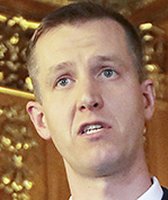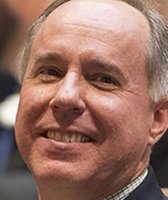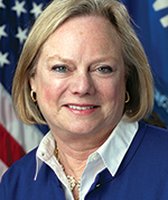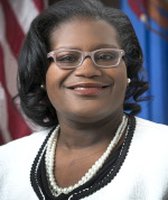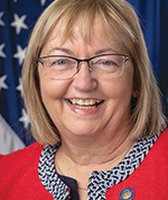Get PolitiFact in your inbox.
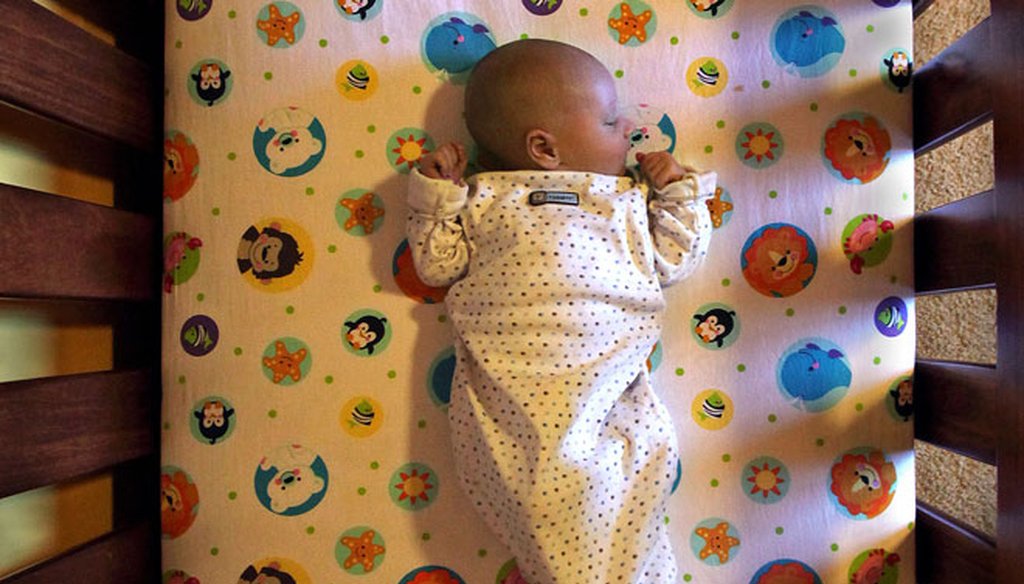
Gov. Tony Evers' budget proposes the elimination of the birth cost recovery program. But is that the same as cutting child support? (Rick Wood/Milwaukee Journal Sentinel).
Wisconsin senator makes point, but goes overboard with birth cost recovery claim
GOP lawmakers, who control both chambers of the Legislature, have made it clear that Gov. Tony Evers’ two-year, $83 billion spending plan unveiled Feb. 28, 2019 faces an uphill climb.
In addition to stark differences about Medicaid expansion, medical marijuana, a proposed gas tax increase and more, there has been pointed criticism on lesser-discussed aspects, such as this shot from state Sen. Dale Kooyenga, R-Brookfield:
"Tony Evers is cutting child support," Kooyenga said April 12, 2019, on the Jay Weber Show on NewsTalk 1130 WISN, which was hosted that day by WISN’s Dan O’Donnell and Matt Kittle of MacIver News Service. "Why would you cut child support, money for the counties that is for child support?"
Kooyenga, went on to say: "We asked about this" and "the reason they gave is there is a progressive element that believes that women don’t need men."
A check of Evers’ budget shows general fund payments to county child support agencies increasing by $750,000 in the first year of the budget, and $1,500,000 in the second year, according to a state budget summary by the Wisconsin Counties Association.
What’s going on here? Let’s take a deeper look.
The evidence
When asked to provide backup, Kooyenga’s communications director Bill Cosh pointed to a particular, narrow aspect of the child-support system -- birth cost recovery.
The child-support system, of course, is based on court-ordered payments made from one parent to another, with the aim of assuring financial support for their child or children. For instance, after a divorce, one parent may be required to make payments to the parent who has primary custody. Or an unmarried biological father may be required to make payments to the mother of his child.
These payments do not come from state taxpayers. But government offices at the county-level do focus on enforcement -- that is collecting money from those ordered to pay. The thinking goes this way: The stronger the enforcement, the more money is paid and the less likely individuals wind up on welfare. So, the state and its taxpayers have a clear interest in assuring payments are made.
Aside from administering that program, the state has been allowed to recover some of the cost of childbirth -- for instance, doctor and hospital costs -- when the mother is on Medicaid.
That’s what Kooyenga was referring to in his claim.
"The amount repaid by the father depends on the birth cost, the father’s monthly income, and regional averages of birth costs," Kooyenga spokesman Bill Cosh said in an email. "Under federal rules, child support agencies will ask the court to set the repayment amount to 5% of the father’s monthly income over a three- year period."
Cosh said that with the money that is collected, 85% must be deposited back into the Medicaid budget. The other 15% is retained by the county child support enforcement agencies.
In 2017, Wisconsin counties retained nearly $2.3 million of the $15.2 million that was collected.
Evers’ budget calls for eliminating the requirement that a court include an order for a father to pay for a portion of pregnancy and birth expenses. The budget also eliminates orders relating to pregnancy and birth expenses and prohibits the state from seeking recovery of birth expenses.
"As originally proposed, Governor Evers’ budget includes a massive decrease to county child support programs that will prevent local child support enforcement agencies from carrying out their basic functions," Kooyenga said in a May 2, 2019 post on his legislative website. "If the Governor’s budget were to come to fruition as proposed, local child support programs would need to lay off staff and reduce services."
Kooyenga called the repayment program "reasonable public policy," writing in the post that: "It reminds the father that they have a child in this world for which they are responsible including reimbursing the state for costs associated with the birth of the child."
How does the reduction in this area square with the general increase included by Evers in his budget?
Cosh argues the increased funding is still less than the amount the counties are able to retain under the birth cost recovery program.
"With the removal of the birth cost recovery program and a general increase, the child support agencies will still inherit a $2.5 million shortfall over the biennium. When accounting for the loss of federal matching dollars, that number increases to $7.5 million over the same time period."
Legislative Fiscal Bureau analysis
Featured Fact-check
The nonpartisan Legislative Fiscal Bureau, considered the gold standard on state fiscal matters, confirms that as part of the 2019-’21 budget bill, Evers has proposed eliminating recovery of expenses related to child birth.
The Fiscal Bureau also pointed out that the budget proposes an increase in funding for local child support enforcement under the state incentive payments to counties provided by the state Department of Children and Families (DCF).
That said, the net result on the enforcement side is a reduction in money.
"The overall net effect from these two proposals on individual counties may differ depending on the amount of funding they would have recovered in births costs compared to the increased amount they would receive under the increase in state incentive payments from DCF," the Fiscal Bureau said in a report. "The overall net effect of the two proposals would be to reduce funding for local child support enforcement agencies because the amount of birth cost recoveries exceeds the proposed increase in incentive payments."
But is it child support?
The Fiscal Bureau report notes the reduction is in the area of enforcement. That can indirectly mean less child support is collected, though it would not affect what is ordered by the court.
So, in that respect, Kooyenga’s statement that Evers "is cutting child support" is overbroad, leaving listeners thinking Evers is asking that non-custodial parents pay less. Indeed, when asked about the reason for the proposal, Kooyenga said "the reason they gave is there is a progressive element that believes that women don’t need men."
When asked what basis Kooyenga had for that comment, Cosh did not clarify the statement, instead saying: "If you are trying to find the reason as to why this provision was proposed, I encourage you to ask Governor Evers why it was included in his budget. "
In an email, Evers’ spokeswoman Melissa Baldauff slammed the comment, saying: "The senator is purposefully misconstruing this issue and making misogynistic comments in the process."
On the claim at hand, Baldauff said the elimination of the birth cost recovery program "is decidedly not a direct reduction in child support funding."
She noted that parents pay child support at an amount determined by statute and the courts and "the governor can’t reduce the amount of child support a parent is obligated to pay."
As to the birth cost recovery program, she said:
"Birth cost recovery dollars are intended to repay for the actual cost of a birth. Many counties, however, elect to retain a portion of these funds. The governor’s overall budget makes a significant investment in counties, well beyond the child support increase discussed, and empowers counties to make funding decisions to best serve their citizens."
That point, though, is disputed by the fiscal bureau, which scores the net result as a loss for counties.
Advocacy group report
Meanwhile, a report by HealthWatch Wisconsin "Birth Cost Recovery in Wisconsin: It’s Not Child Support," argues "the policy does not support children; rather it supports child support offices."
The Birth Cost Recovery policy "is a collections process directed by the State of Wisconsin and implemented by County Child Support Agencies that aggressively pursues the recovery of Medicaid supported birthing costs from unmarried, often non-custodial fathers," the report says.
HealthWatch Wisconsin also pointed out that child support is not the same as child support enforcement.
"Unlike child support, none of the recovered dollars go to support the children and families -- it is all directed to reimburse the government at the federal, state and local level."
HealthWatch Wisconsin, according to its LinkedIn profile, is membership organization that is a project of ABC for Health, which is a nonprofit promoting access to health care.
Our ruling
Kooyenga said "Tony Evers is cutting child support."
Evers’ budget does seek to eliminate the state’s birth cost recovery program. And, according to the Legislative Fiscal Bureau, the hole that leaves in the budget would exceed additional money included by Evers for local child support enforcement agencies.
Kooyenga’s statement was overbroad in that it suggests Evers is advocating a reduction in support paid to children by non-custodial parents. But with less money available for enforcement, it could indirectly reduce the amount collected from court-ordered judgements.
We rate Kooyenga’s claim Half True.
Our Sources
Jay Weber Show, NewsTalk 1130 WISN, April 12, at 48.00 mark.
Milwaukee Journal Sentinel, "How much of Democratic Gov. Tony Evers’ budget will survive the GOP Legislature? (Spoiler: Not much), Feb. 27, 2019
Milwaukee Journal Sentinel"Gov. Tony Evers seeks to raise gas tax by 8 cents a gallon while reducing the overall price at the pump," Feb. 28, 2019.
Associated Press/WMTV "Gov. Evers reveals state budget to Wisconsin legislators," Feb. 28, 2019.
The Wheeler Report "Senate Majority Leader Scott Fitzgerald Responds to Governor Evers' Budget Address," Feb. 28, 2019.
Right Wisconsin "Reaction for Legislators to Governor Tony Evers’ State Budget Plan," March 1, 2019.
Email, Sen. Dale Kooyenga communications director Bill Cosh, May 3, 2019.
Email, Melissa Baldauff, spokeswoman for Gov. Tony Evers, May 9, 2019.
Wisconsin Department of Children and Families "Repaying Birth Costs."
Wisconsin Counties Association 2019-21 STATE BIENNIAL BUDGET SUMMARY, March 2019.
LinkedIn HealthWatch Wisconsin
Waukesha County Office of Corporation Counsel Child Support Division, "Wisconsin Birth Cost Recovery Program," Nov. 26, 2018.
Legislative Fiscal Bureau "Summary of Governor’s Budget Recommendations, 2019-21 Wisconsin State Budget," March 2019.
Sen. Dale Kooyenga "Protecting Child Support," May 2, 2019.
HealthWatch Wisconsin "Birth Cost Recovery in Wisconsin: It’s Not Child Support,"
ABC for Health "Our Mission."
Browse the Truth-O-Meter
More by D.L. Davis
Wisconsin senator makes point, but goes overboard with birth cost recovery claim
Support independent fact-checking.
Become a member!
In a world of wild talk and fake news, help us stand up for the facts.

